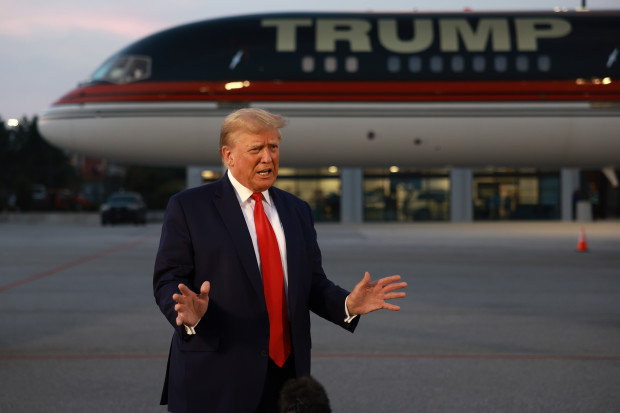
Former President Donald Trump has had big dreams of being a media mogul in addition to presidential candidate.
But the path has been filled with potholes and faces a big moment of truth this coming week.
Digital World Acquisition Corp. (DWAC) -), a Florida company formed to enable Trump's media company, Trump Media & Technology Group, to go public quickly, needs real help from its shareholders.
Trump Media is the holding company that owns Trump Social, which regularly posts the former president's comments.
The problem revolves around the process. Digital World is known as a special purpose acquisition company or SPAC. The plan was to use the cash to buy Trump Media, which would then become a public company with fewer hoops to jump through than a regular initial public offering. That, in turn, would bring in another $1 billion raised in a private offering, largely to hedge funds.
The problem is the rules about how SPACs may operate. The biggest is that a SPAC, which raises money to buy companies, can't hold onto investors' money indefinitely. The company should consummate a deal in a year. If it can't, then it must return the money to the investors or get them to agree to extend the deal.
Digital World raised its $300 million in October 2021, selling shares at $10 each. The shares briefly shot up to $175. But Digital World still hasn't been able to close the deal in large part because of objections from the Securities & Exchange Commission, and the shares have slid below $20.
On Friday, the shares closed at $16.51, up 9 cents. They finished August down 2.7%. They're up 31.5% for the third quarter but only 10.01% on the year.
Now Digital World is asking its shareholders to vote Tuesday to extend the deadline for up to another year — or Digital World will liquidate. Digital World must win 65% of shares for the extension to pass, according to SEC rules.
But that's all shares. And that's the problem.

Let's say a company with 1 million shares outstanding gets 600,000 shares voting for the idea and 250,000 voting no. Yes, 70.6% of those who VOTED were for the idea. But 150,000 shares were not voted at all. Under SEC rules, the non-votes are counted as "No" votes, and, so, the measure would fail.
The stakes for Trump Media, thus, are big. A failed vote would severely cripple the company's prospects. It's $1-billion cash infusion would be at risk.
Needless to say, Digital World has been lobbying shareholders furiously to vote their shares for the extension.
The Washington Post on Saturday described a no vote as potentially "catastrophic." Digital World CEO Eric Swider conceded in an Aug. 22 letter to shareholders the company might have to start liquidating on Friday.
Digital World, however, faced this same issue a year ago and postponed a special meeting six times before it won the necessary votes. It wants another year's worth of extensions so it can hunt for votes.
In the meantime, its relationship with the SEC remains tense.
Digital World has charged the commission's concerns and objections are political. But the SEC has charged violations of SPAC and other rules because the company was talking to Trump's team before allowed to, under SEC rules. This summer, Digital World agreed to pay $18 million when the deal closes to settle insider trading violations.
Digital World also hasn't filed quarterly financial reports this year and could be delisted by the Nasdaq exchange if the reports aren't filed by November.
SPACs were very hot investments in 2020 and 2021, but investors who had clamored to buy into them found themselves burned by companies that could not deliver profits, anything close to profits, or even sales.
So, over the last two years, shares of SPACs slumped, often badly. The market has largely dried up, along with the market for initial public offerings generally.
If this scenario sounds familiar, it is. The SPAC history, starting in 2019, is eerily similar to the dot.com boom of the 1990s that crashed in 2000.







